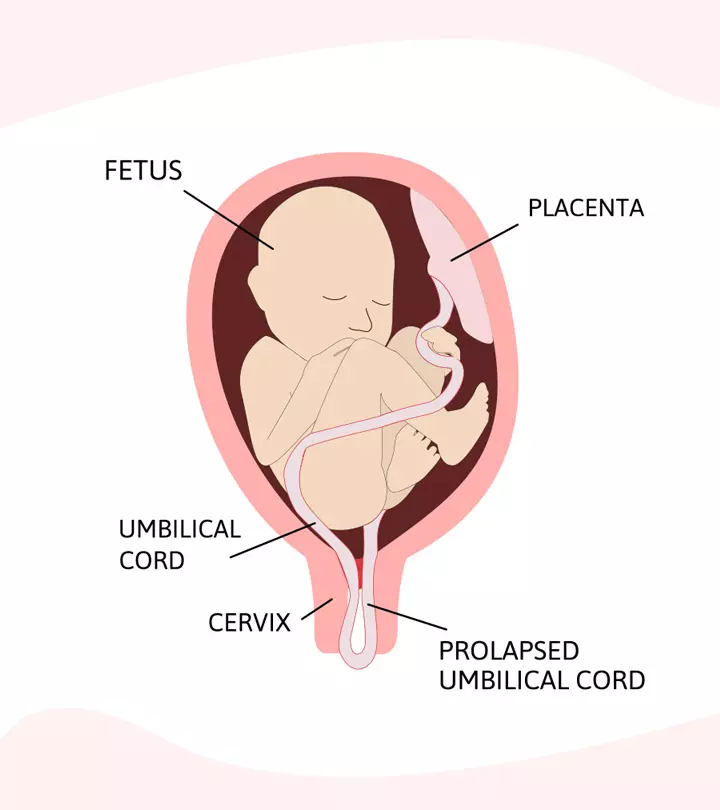
Image: ShutterStock
Sex during pregnancy is considered safe as long as you feel comfortable and your doctor does not ask you to avoid it for some health conditions

. It may also provide several benefits, including better sleep, good hormones, and intimacy with your partner. However, some women might worry if they experience bleeding after sex while pregnant. Bleeding after sex (also known as postcoital bleeding) may be due to multiple causes; however, in most cases, it is not an issue to worry about (1). Nevertheless, if you notice bleeding after sex, it is better to see a healthcare provider. Read the post to understand more about the causes of bleeding after sex during pregnancy, its treatment, and tips to stay safe and comfortable.
Key Pointers
- Consult your doctor if you have medical conditions that may require you to avoid sex during pregnancy, despite it being generally safe.
- Causes of bleeding during pregnancy may include a sensitive cervix due to increased capillaries, implantation, placenta previa, blood circulation, and placental abruption.
- Treatment options for bleeding after sex during pregnancy include bedrest, avoiding sex, avoiding travel, hospitalization, or surgery in severe cases.
- To minimize the risk of bleeding and complications during pregnancy, try comfortable sex positions, consider oral sex, use lubricants, and use barrier contraceptives.
- Avoid sex during pregnancy if your doctor recommends it, or if you have a weaker cervix or have had a previous miscarriage.
Is It Normal To Bleed After Sex When Pregnant?
Any bleeding, light or heavy, after 20 weeks of pregnancy is not normal (2). You should see a doctor immediately. But do not panic as not all bleeding is dangerous. You must avoid sex to prevent further complications and seek your doctor’s advice on when you can resume it.
What Causes Bleeding After Sex During Pregnancy?
A tender and sensitive cervixiThe lowest portion of the uterus that connects to the vagina to form a passage between the two organs. causes bleeding after sex while pregnant. The cervix could be sensitive–because of:
- Increased blood supply: The rate of blood supply to the vagina and cervix increases considerably soon after you conceive. During sex, there would be added pressure over the cervical area, causing minor bleeding or spotting (3).
- Increased capillaries: Several blood capillaries (tiny blood vessels) form during pregnancy to meet the high oxygen demands of the mother and fetus. Many of these capillaries develop in the vagina and cervix. They are so delicate that they rupture easily during intercourse.
- Cervical polyps: Polyps are harmless growths on the cervix due to high estrogen levels. They are fragile, contain small blood vessels, and any pressure on the area during intercourse could cause bleeding. Experts recommend examining the polyps by removing them to rule out the possibility of cancer (4). According to the National Institutes of Health (NIH), although most cervical polyps are generally benign, malignant polyps can also occur, albeit rare, and account for approximately 0.2% to 1.5% of the cases.
You may also experience bleeding after sex for the following reasons:
- Implantation: In four to five weeks of gestation, you may notice bleeding after sex when the pregnancy implants in the uterus (5).
- Ectopic pregnancy: This condition is rare but happens when the fertilized egg starts growing outside the uterus. It may cause heavy bleeding and needs medical assistance (5).
- Placenta previa: In this condition, the placenta lies low in the uterus and covers the cervix fully or partially. Therefore, the chances of miscarriage are high if you have intercourse (5).
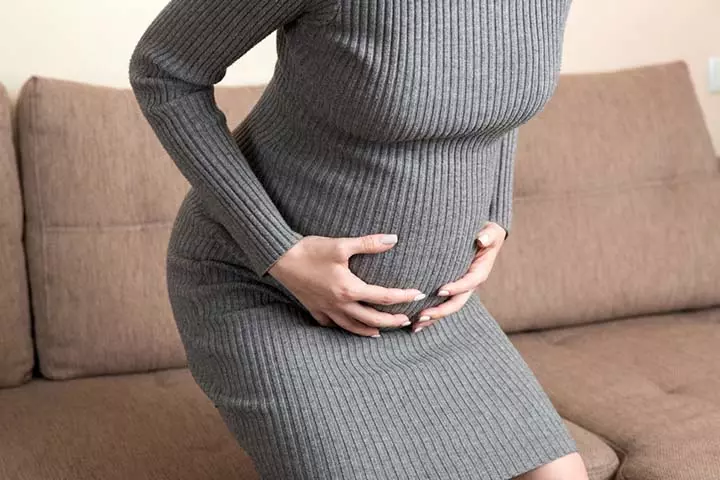
Does Bleeding After Sex Mean Miscarriage?
Sex-triggered miscarriages are rare because the fetus is secured in the amniotic saciThe membranous sac containing the amniotic fluid that protects and nourishes the developing fetus filled with fluid
. This cushions the baby and acts as a shock absorber from physical harm. Moreover, the baby is placed away from the intercourse region (6).
However, if you have had a miscarriage earlier or weakened cervical walls, the doctor will recommend you to abstain from sex as a safety measure (7).
Treatment For Bleeding After Sex
If you experience bleeding after sex during pregnancy, your doctor will conduct a pelvic exam and advise an ultrasound or MRIiA medical imaging technology that helps evaluate and create detailed images of the organs and structures of the body (magnetic resonance imaging). You may also be asked to take blood and urine tests (8).
Based on the test results and your physical condition, doctors may advise (8):
- Bedrest
- Avoiding sex
- Avoiding travel
- Hospitalization
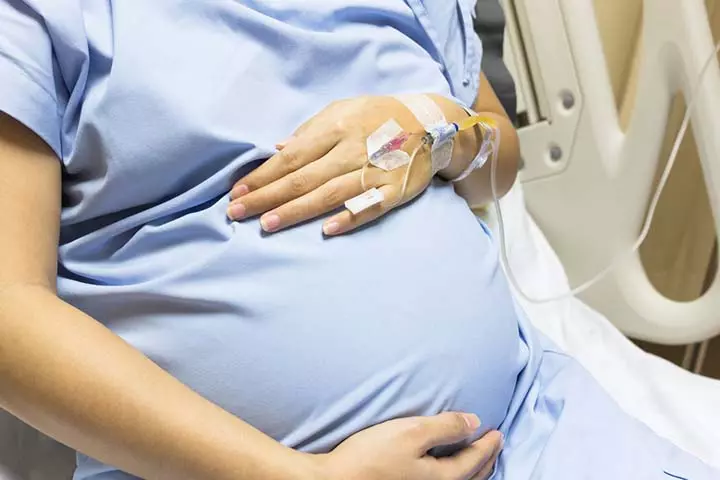
- Surgery in case of severe bleeding
 Quick tip
Quick tipTips For Being Physically Intimate During Pregnancy
You could minimize the bleeding risks and complications by following some simple rules.
1. Try comfortable and safe sex positions
Some sexual positions can increase the risk of vaginal spotting or bleeding by exerting pressure on the cervical area
. You could try safe positions such as spooning and rear entry (9).
2. Consider oral sex
It is one of the safest practices to get sexual satisfaction without intercourse during pregnancy. Though not harmful to the baby, refrain from blowing air into the vagina as it can cause an air embolism (blockage of blood supply due to air bubbles in the blood vessels (10).
3. Have cozy moments
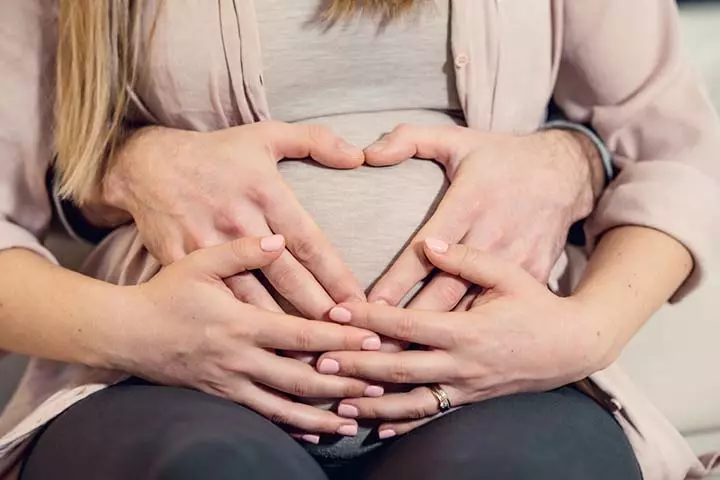
Be as gentle as possible with progressing pregnancy. You can enjoy the intimacy through cuddling, kissing, hugging, holding hands, and sharing a shower as they are more comfortable. Discuss with your partner what you like (11).
4. Use lubricants
Use water-based lubricants as they help reduce friction and discomfort during intercourse (9). They will also reduce bleeding and the chances of irritation in the cervical region. Avoid those containing glycerin as it is likely to cause thrush.
5. Use contraceptives
Use barrier contraceptives such as condoms during intercourse. They will protect you and your baby from sexually transmitted infections (STIs) (12).
 Point to consider
Point to considerWhen Should You Avoid Sex During Pregnancy?
You should avoid sex during pregnancy under these conditions (1).
- Cervical incompetence: It is a condition where the cervix starts to open prematurely and increases the risk of miscarriage and premature loss.
- History of miscarriage or premature labor: If you have had miscarriages or preterm labor leading to premature births during previous pregnancies, the doctor may advise you to avoid sexual intercourse. Semen has prostaglandinsiGroup of substances that play an essential role in producing inflammatory responses and other processes , whereas orgasm causes the brain to release oxytociniA chemical messenger and hormone that is involved in childbirth, lactation, and social bonding . Both hormones may cause early contractions.
- Leakage: If you feel your amniotic fluid is leaking, it may indicate the rupture of the amniotic sac. You should avoid sex in this case and contact a doctor.

 Quick tip
Quick tipHow Much Bleeding Is Normal In Pregnancy?
Light spotting in early pregnancy during the first trimester is usually normal and not typically a cause for concern, though you should inform your healthcare provider, especially if you are unsure if it is light spotting or heavier bleeding. Causes of minor first-trimester spotting are often not worrisome, though some potential causes do warrant medical attention.
However, any bleeding resembling a menstrual period in flow or duration is not considered a normal symptom during pregnancy and should prompt an immediate call to your healthcare provider, as should bleeding accompanied by pain or occurring in larger amounts than light spotting. While not all bleeding indicates complications, heavier flow or bleeding with pain can signify issues needing medical care (8).
When To See A Doctor?

Any bleeding concerns should be brought to your doctor’s notice. Evaluate the nature, appearance, and quantity of bleeding after intercourse, track any accompanying symptoms, and keep a record to let your healthcare provider assess the situation more accurately. You should ideally wear a sanitary pad to see the type of bleeding so you can give the right details to the doctor.
Here are some symptoms you should not ignore if they accompany bleeding or spotting after sex during pregnancy (8):
- Intense cramps and pain in the lower abdomen or pelvic region
- Heavy and consistent vaginal bleeding
- Vaginal discharge that may show tissues and clots
- Fainting or dizziness
- High fever with or without chills
- Shortness of breath (5)
- Uterine contractions that begin and continue even after sexual intercourse
- You should talk to your doctor to avoid complications even if you have mild bleeding without any pain or cramping.
Frequently Asked Questions
1. Can I bleed after sex during early pregnancy?
Yes, it is normal to bleed after sex in your early pregnancy, as orgasm can cause uterine contractions that can rupture tiny blood vessels (8). But as you progress to the second and third trimesters, the hormonal changes and its increase in activity may reduce the bleeding.
2. During pregnancy, is it normal to bleed after sex and have no pain?
Yes, it is normal to bleed after sex without any pain. If it is mild bleeding, you might feel no pain, unlike heavy bleeding and painful blood clots. Heavy bleeding after sex is not normal. So, it is always advisable to check with your doctor and get a checkup done to ensure there is no other reason (14) (15).
3. What does light pink spotting after intercourse mean?
Pink spotting or discharge after sex during pregnancy is blood mixed with vaginal fluid. But sometimes, it can be due to anemia or disturbed integrity of blood vessels. Therefore, it is advisable to consult your doctor.
4. How long does the bleeding last after sex during pregnancy?
In most cases, mild bleeding that is lightly stained may continue for a few hours but gradually reduces and stops. If it is heavy or persistent, you should report to a doctor.
5. Can bleeding during pregnancy affect the baby?
Light bleeding during pregnancy may occur for several reasons, such as rupturing minor capillaries, cervical polyps, etc. These are harmless to the mother and the fetus. However, in some cases, bleeding during pregnancy can be a sign of trauma and may indicate a serious problem. if the mother has signs of low blood pressure, spotting or clotty bleeding, pain or irritation in the lower abdomen, feels a lack of fetal movement, an unusual enlargement or hardening of the belly surface, or a leak in the amniotic fluid then it is essential for her to consult a doctor (16) (17).
Pressure during intercourse could lead to rupture of cervical blood vessels, resulting in bleeding after sex while pregnant. However, you may choose safe sex positions to avoid damage to blood vessels and reduce the risk of complications. Also, note that any bleeding during pregnancy may signify several other conditions. Therefore, it is essential to consult a doctor to clear your apprehensions about bleeding during pregnancy. Nevertheless, taking necessary precautions could help you enjoy private moments with your partner before the baby arrives.
Infographic: What Could Lower Sex Drive During And After Pregnancy?
Many reasons during pregnancy can decrease the sex drive in pregnant women, varying each trimester. New mothers have low libidos for at least the first few weeks after childbirth. Read the infographic below to get a sense of what is causing them to avoid physical intimacy.
Some thing wrong with infographic shortcode. please verify shortcode syntax
Illustration: Bleeding After Sex During Pregnancy: Is this Normal?
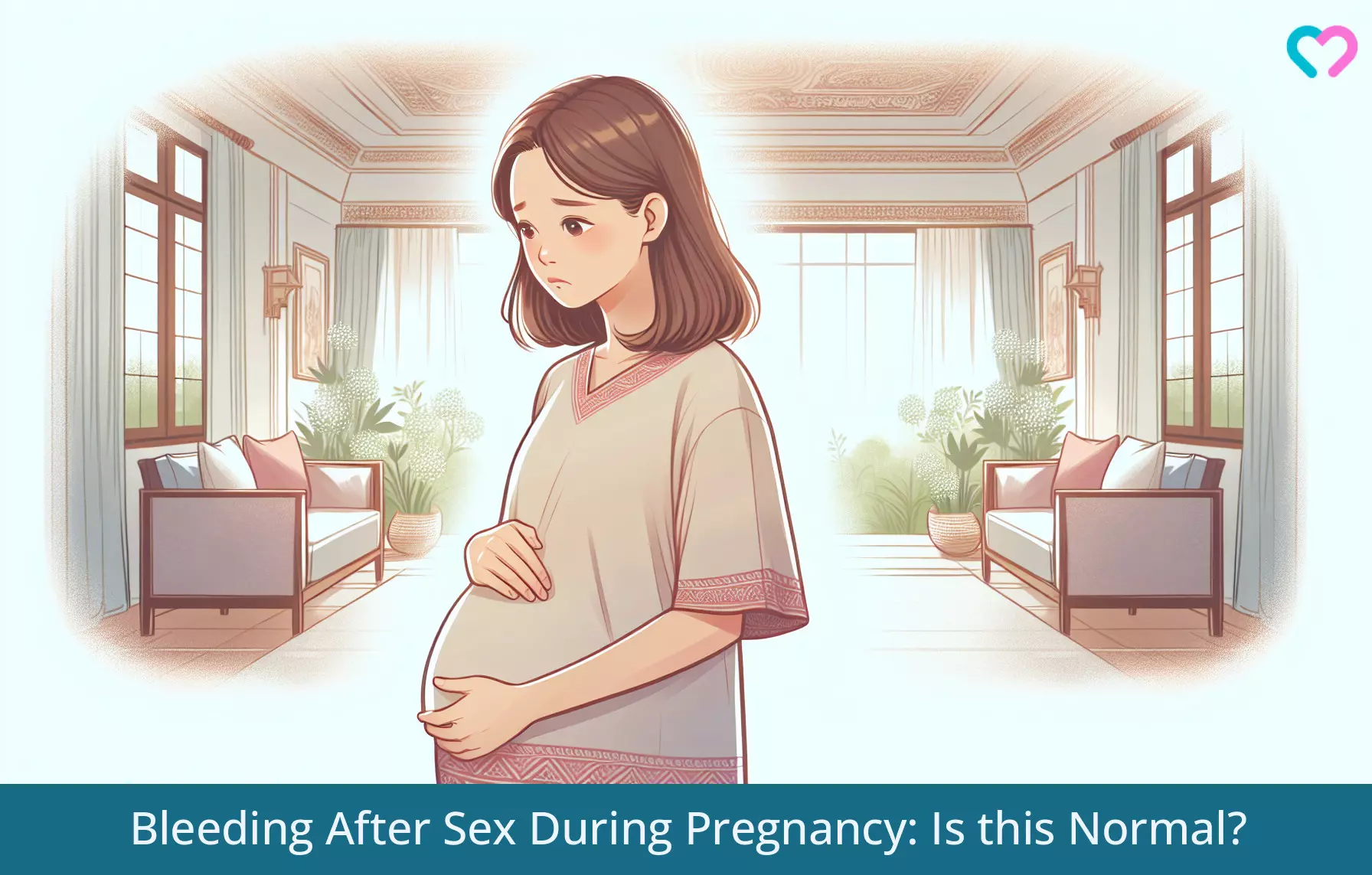
Image: Dall·E/MomJunction Design Team
References
- Sex During Pregnancy: Your Questions Answered.
https://health.clevelandclinic.org/sex-during-pregnancy-your-questions-answered - Bleeding in Pregnancy/Placenta Previa/Placental Abruption.
https://www.chop.edu/conditions-diseases/bleeding-pregnancyplacenta-previaplacental-abruption - Vaginal bleeding.
https://www.healthdirect.gov.au/vaginal-bleeding - Cervical Polyps.
https://www.health.harvard.edu/a_to_z/cervical-polyps-a-to-z - Bleeding during pregnancy.
https://www.pregnancybirthbaby.org.au/bleeding-during-pregnancy - Sex in pregnancy.
https://www.nhs.uk/pregnancy/keeping-well/sex/ - Andrew Moscrop; (2012); Can sex during pregnancy cause a miscarriage? A concise history of not knowing.
https://www.ncbi.nlm.nih.gov/pmc/articles/PMC3310038/ - Bleeding During Pregnancy.
https://my.clevelandclinic.org/health/symptoms/22044-bleeding-during-pregnancy - Hsin-Li Liu et al.; (2013); Sexual Activity during Pregnancy in Taiwan: A Qualitative Study.
https://www.ncbi.nlm.nih.gov/pmc/articles/PMC4184498/ - Sex During Pregnancy: Common Questions And Practical Answers.
https://www.ncbi.nlm.nih.gov/pmc/articles/PMC2609783/pdf/jnma00467-0059.pdf - Viola Polomeno; (2000); Sex and Pregnancy: A Perinatal Educator\’s Guide.
https://www.ncbi.nlm.nih.gov/pmc/articles/PMC1595041/ - B C Schmid et al.; (1991); Condom use during pregnancy.
https://www.ncbi.nlm.nih.gov/pmc/articles/PMC1405157/ - Claire Jones; (2011); Sex in pregnancy.
https://www.ncbi.nlm.nih.gov/pmc/articles/PMC3080531/ - SEX DURING PREGNANCY.
https://www.marchofdimes.org/find-support/topics/pregnancy/sex-during-pregnancy - Vaginal or uterine bleeding.
https://medlineplus.gov/ency/article/007496.htm - Bleeding in Pregnancy/Placenta Previa/Placental Abruption.
https://www.chop.edu/conditions-diseases/bleeding-pregnancyplacenta-previaplacental-abruption - Gestational vaginal bleeding and pregnancy outcome.
https://pubmed.ncbi.nlm.nih.gov/2923126/
Community Experiences
Join the conversation and become a part of our nurturing community! Share your stories, experiences, and insights to connect with fellow parents.
Read full bio of Dr. Sangeeta Agrawal
Read full bio of Pragya Bhargavi
Read full bio of Rebecca Malachi
Read full bio of Reshmi Das







